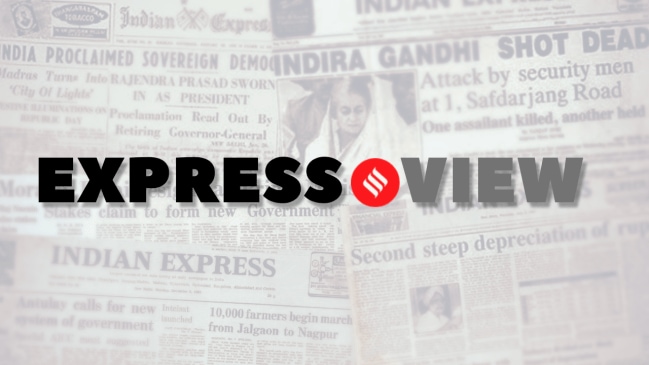Opinion Congress outrage over ED may not find much of an echo. But police action at its office strikes many a disturbing chord
If the health of a democracy is also measured by the safe, and indeed respectful, spaces that it provides for dissent, disagreement and protest, the last few years have not painted a rosy picture.
 The political battle between the Congress and the BJP seems currently skewed comprehensively in the latter's favour, and the Opposition is divided and fragmented.
The political battle between the Congress and the BJP seems currently skewed comprehensively in the latter's favour, and the Opposition is divided and fragmented. The Congress’s full-throated protests against the ED questioning of Rahul Gandhi over three days in the National Herald money laundering case raise questions. Why does the party get agitated only on the alleged targeting of its leader, and not, say, on a range of issues where hard questions need to be asked and answers demanded, from bulldozers trampling due process in BJP-ruled states to witch-hunt of Opposition leaders, not just the First Son. Even on the issue of political vendetta, why does the Congress seem so isolated? Those are the questions for the Congress. But the images of police overzealousness that have also come in over the last few days from the heart of the national capital, stretching from the Congress Headquarters to the office of the Enforcement Directorate, have touched off another set of questions — these must be answered by the BJP government that Delhi Police reports to. Photos and videos of the barricading of the Congress office, of police entering the premises and pulling and dragging office-bearers and workers, the rough treatment meted out to a Youth Congress leader and a woman Congress MP, are unseemly. Admittedly, the scene of action was a high security zone, prohibitory orders were in place. And yet, the police heavy handedness on show in response to what was, after all, a legitimate political protest even if a limited one, underlines a larger and disturbing tendency of the BJP-led Centre vis a vis political opponents and dissenters — to favour the police response over the political.
If the health of a democracy is also measured by the safe, and indeed respectful, spaces that it provides for dissent, disagreement and protest, the last few years have not painted a rosy picture. The record of BJP governments, be it the Modi government at the Centre or the Yogi government in UP, has been scarred by an intolerance of political opponents and others who ask questions or oppose its politics and policy. In a democracy, the winner does not take all. And winning the mandate, even winning it decisively, does not mean an end to all argument — it only casts a responsibility on the ruling party to reach out and negotiate, to persuade and accommodate. The BJP’s fantasy of an “Opposition-mukt” India would be a colourless and chilling place, if it ever came true.
The political battle between the Congress and the BJP seems currently skewed comprehensively in the latter’s favour, and the Opposition is divided and fragmented. Even in the present instance, the Congress has hit the streets, but its indignation over the ED questioning of its leader has notably failed to strike a chord with the people at large or with other Opposition parties. There may be no political or electoral penalties to pay for the BJP, therefore, for denying space for protest to the main Opposition party. But the rules of the game, written and sometimes unwritten, call for the government to show respect to those who stand, or agitate, on the other side of the political fence. By not doing so, the ruling party keeps steadily corroding its victories.


